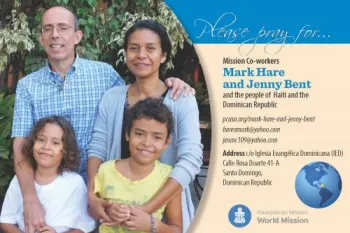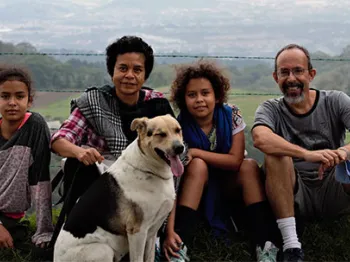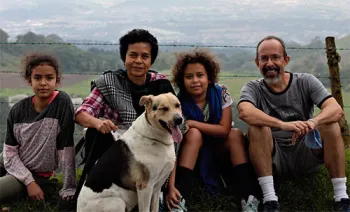Co-Workers
Mark Hare and Jenny Bent
-
Image
![Mark Hare and Jenny Bent family photo]()
-
![]()
About Mark Hare and Jenny Bent's Ministry
In 2012, Jenny began partnering with the Iglesia Evangélica Dominicana (IED) as it prioritized reaching out to the marginalized communities served by its churches. The IED invited her to begin a pilot project using Community Health Evangelism (CHE) in the community of Batey 7, one of some 15 or more settlements among the sugarcane fields of the Dominican southwest. The goal of CHE is to equip communities to identify and mobilize the resources they already have to engage with the issues they face and work for positive and sustainable change. The response of community leaders from Batey 7 was ultimately very positive, and in 2015 the IED took CHE to the national level and began introducing it to every region of the country.
Mark has been working with Presbyterian World Mission since 1997. After working in a reforestation program in Haiti for a year, he spent six years in Nicaragua focusing on developing agricultural systems and providing practical training for rural families. In 2004, he began serving in Haiti with the Farmer’s Movement of Haiti (MPP) and was able to apply much of what he had learned in Nicaragua to his work at the MPP’s National Training Center. Joining Mark in Haiti after their wedding in 2008, Jenny served with MPP as a volunteer in their rural health clinic. After moving to the Dominican Republic in 2012, Mark traveled to Haiti on a monthly basis, continuing to train teams of farmers in yard garden production techniques with Haitian farmer movements. He also began learning about CHE alongside Jenny and applying its holistic techniques to teaching vegetable production.
In January 2020, Jenny and Mark brought what they learned from their work with Dominican and Haitian communities to Costa Rica
where they serve as two of the members of a team of nine or ten students, administrative staff, and faculty members at the Latin American Biblical University focused on climate justice and ecological sustainability. Since 2016 the people of the Latin American Biblical University (UBL), based in the city of Montes de Oca, just to the east of San José, Costa Rica, have been on a journey of becoming a “green seminary,” an institution searching to reduce harm to ecological systems and to begin regenerative practices that help heal our wounded Creation. The theologian Karla Koll, also a mission co-worker sent by World Mission, helps facilitate the work of the team.
Concretely, as members of the Green UBL team Jenny and Mark provide support for and help advance initiatives focused on conservation of water and electricity, reducing, reusing, and recycling solid waste, as well as developing liturgies with an environmental justice focus. The team also helps promote the creation of courses with an environmental component and they organize online webinars with experts on topics such as extractive industries, regenerative agriculture, climate change and climate debt v/s external debt.
The Green UBL team is also providing outreach to local churches and communities, as well as “evangelizing” the internal community of faculty and staff with concrete actions focused on Climate Justice. Since 2018, for example, the team has maintained a vegetable garden of about 25 square yards, plus an area for composting. Since 2021 they have successfully raised compost worms, producing high quality, bio-dynamic vermicompost. In 2023 they began producing some of the necessary plant starts for the garden, which requires a whole new level of skill and administration.
In 2022 the Green UBL team initiated a new, 75 square yard garden in the form of a mandala on approximately 1200 square yards of land that the university owns immediately adjacent to the main campus. At the end of 2022 the team reached out to the local community, called Cedros, and four or five older women, together with two younger women responded. In 2023, through workshops and workdays, the group continued to grow the garden space, improving their skills and knowledge, producing more and more healthy food, and strengthening their ties of friendship and service with each other, even as they found ways to invite new people into the garden space. The garden program is also nourished by and nourishes students from the nearby national Costa Rican University; the students work with the community members while they complete the community service required for graduation.
The Cedros garden team help host volunteers who come to the UBL to work in the library and the garden. In 2023 they hosted a Swiss agricultural student doing a professional internship through the Swiss NGO, “Mission Twenty-One.” The student completed research for her bachelor thesis while working with the community garden.
In recognition of its dedication to climate justice and ecological sustainability, the UBL has received international certification as a “Green Seminary.” The institution is also successfully working with a Costa Rican government program called “The Blue Banner” which provides an annual certification of ecological sustainability.
Mark and Jenny periodically visit the U.S. and are able to visit congregations as their schedule allows. Email them to extend an invitation to visit your congregation or organization.
Country context
Costa Rica borders the Pacific Ocean to the west, the Caribbean Sea to the east, Nicaragua to the north, and Panama to the south. It has one of the highest life expectancy rates in Central America. Tourism and commerce are Costa Rica’s main industries, accounting for 68% of its GDP. It has a growing technology/computer chip industry, and its main agricultural products include bananas, coffee, sugar and beef. In spite of its well-established commitment to social welfare and education, Costa Rica is increasingly dealing with critical issues such as poverty, political crisis, drug trafficking, sexual tourism, domestic violence and the impact of mass immigration from Nicaragua due to poverty and political crisis in this neighboring nation. Although Costa Rica has some of the most favorable economic indices in Central America, the percentage of the population living in poverty has increased significantly in recent years.
About three-quarters of Costa Ricans are Roman Catholic, and approximately 15% are Protestant.
About Jenny Bent and Mark Hare

Even as a child, Jenny Bent felt that her primary calling in life is to love others as herself. She explains, “In the moments when I act in love, I feel something that is very deep and makes me grow. Just like babies laugh because they feel something is good, without anyone teaching them. Since birth, even before being baptized into the church, I have been called to love with all my senses and wisdom.”
Jenny’s work in Community Health Evangelism (CHE) in the Dominican Republic provided her with abundant opportunities to practice love through walking alongside, listening to and supporting communities as they determined what they needed to thrive. As she continues her ministry of presence in Costa Rica, Jenny looks forward to being present with and learning from Costa Rican communities and refugees from her native Nicaragua who have fled to Costa Rica. Moreover, she believes the people she and Mark will encounter through the UBL will contribute to her growth as a CHE facilitator. She anticipates learning from UBL seminarians about the theological bases for CHE and about the valuable things they have learned from their parishioners. In turn, Jenny hopes that “seminarians will learn something about CHE and make it uniquely theirs.”
Caring for the environment is at the core of Mark’s call. “I believe that my particular calling is to love the Earth and be intimately involved with the natural world,” he says. He sees working with the UBL, a seminary that recognizes the connection between theology, community development and the environment, as an honor. His experience as a mission co-worker in Haiti and the Dominican Republic have demonstrated that such practical theology is vital: “Applying principles of CHE in my work with rural families in Haiti and marginalized urban families and congregations in the Dominican Republic, I came to appreciate how important it is to address people’s spirituality in helping them move towards sustainable community development.” The UBL, he believes, will help him better understand how to “make the connection between what we believe and living it.”
Jenny is originally from Nicaragua. Her father, Norman Bent, is a retired pastor of the Moravian Church and a long-time social advocate in ecumenical programs for peace and justice. Her mother, Modestina, was a Sunday school teacher and very involved in her local women’s group. Jenny is the third child of a family of five. She attended college at the National Autonomous University of Nicaragua, where she received her bachelor’s degree in laboratory science. Her special interests include sewing, crocheting and growing roses.
The youngest of five children, Mark grew up in southeast Ohio in the foothills of the Appalachians. His father, Rev. Frank E. Hare, was involved for over 30 years with the Coalition for Appalachian Ministry, an organization of Reformed denominations that helps connect and support community-based organizations. Mark’s mother, Catherine, remains passionate about Christian education, which she helps lead for the Amesville-New England parish. Mark has a B.A. in environmental studies from Warren Wilson College and an M.S. in forestry from Michigan State University.
Jenny is a member of First Moravian Church in Managua, Nicaragua. Mark is a member of Amesville Presbyterian Church in Amesville, Ohio, part of the Scioto Valley Presbytery. Married since 2008, they are the parents of two daughters, Keila Rosa and Annika Estela.
Birthdays:
Mark – December 9
Jenny – October 9
Keila – July 16
Annika – July 10



